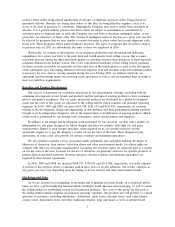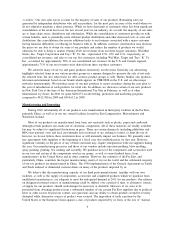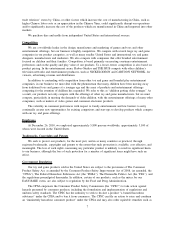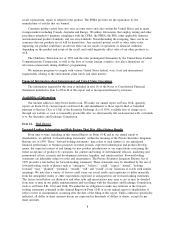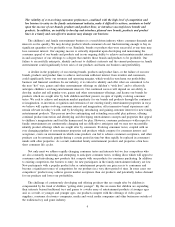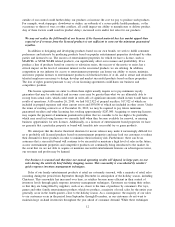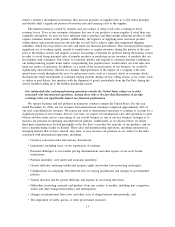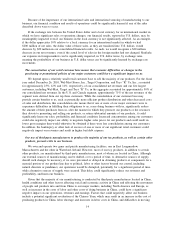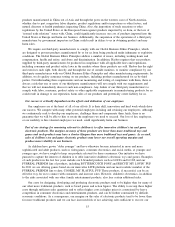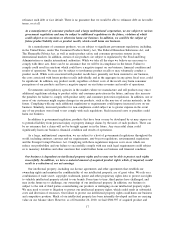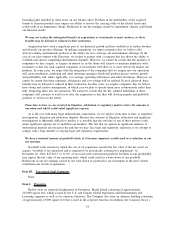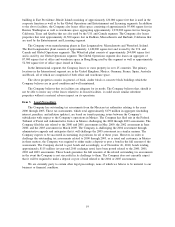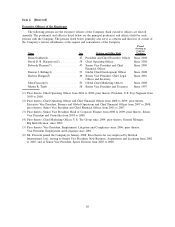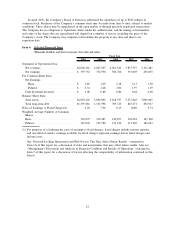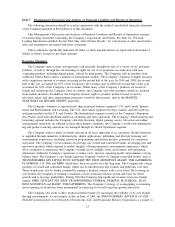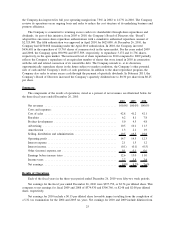Hasbro 2010 Annual Report Download - page 25
Download and view the complete annual report
Please find page 25 of the 2010 Hasbro annual report below. You can navigate through the pages in the report by either clicking on the pages listed below, or by using the keyword search tool below to find specific information within the annual report.products manufactured in China out of Asia and through the ports on the western coast of North America,
whether due to port congestion, labor disputes, product regulations and/or inspections or other factors, and
natural disasters or health pandemics impacting China. Also, the imposition of trade sanctions or other
regulations by the United States or the European Union against products imported by us from, or the loss of
“normal trade relations” status with, China, could significantly increase our cost of products imported into the
United States or Europe and harm our business. Additionally, the suspension of the operations of a third party
manufacturer by government inspectors in China could result in delays to us in obtaining product and may
harm sales.
We require our third-party manufacturers to comply with our Global Business Ethics Principles, which
are designed to prevent products manufactured by or for us from being produced under inhumane or exploitive
conditions. The Global Business Ethics Principles address a number of issues, including working hours and
compensation, health and safety, and abuse and discrimination. In addition, Hasbro requires that our products
supplied by third-party manufacturers be produced in compliance with all applicable laws and regulations,
including consumer and product safety laws in the markets where those products are sold. Hasbro has the right
and exercises such right, both directly and through the use of outside monitors, to monitor compliance by our
third-party manufacturers with our Global Business Ethics Principles and other manufacturing requirements. In
addition, we do quality assurance testing on our products, including products manufactured for us by third
parties. Notwithstanding these requirements and our monitoring and testing of compliance with them, there is
always a risk that one or more of our third-party manufacturers will not comply with our requirements and
that we will not immediately discover such non-compliance. Any failure of our third-party manufacturers to
comply with labor, consumer, product safety or other applicable requirements in manufacturing products for us
could result in damage to our reputation, harm sales of our products and potentially create liability for us.
Our success is critically dependent on the efforts and dedication of our employees.
Our employees are at the heart of all of our efforts. It is their skill, innovation and hard work which drive
our success. We compete with many other potential employers in hiring and retaining our employees. Although
we continuously seek to develop our employees, challenge them and compensate them fairly, there is no
guarantee that we will be able to hire or retain the employees we need to succeed. Our loss of key employees,
or our inability to hire talented employees we need, could significantly harm our business.
Part of our strategy for remaining relevant to children is to offer innovative children’s toy and game
electronic products. The margins on many of these products are lower than more traditional toys and
games and such products may have a shorter lifespan than more traditional toys and games. As a result,
sales of children’s toy and game electronic products may lower our overall operating margins and
produce more volatility in our business.
As children have grown “older younger” and have otherwise become interested in more and more
sophisticated and adult products, such as videogames, consumer electronics and social media, at younger and
younger ages, we have sought to keep our products relevant for these consumers. One initiative we have
pursued to capture the interest of children is to offer innovative children’s electronic toys and games. Examples
of such products in the last few years include our I-branded products such as I-DOG and I-CAT, and our
FURREAL FRIENDS line of products, including BUTTERSCOTCH PONY and BISCUIT MY LOVIN’ PUP.
In 2011 we are offering games based on our innovative LIVE platform and our most realistic member of the
FURREAL FRIENDS line to date, COOKIE, MY PLAYFUL PUP. These products, if successful, can be an
effective way for us to connect with consumers and increase sales. However, children’s electronics, in addition
to the risks associated with our other family entertainment products, also face certain additional risks.
Our costs for designing, developing and producing electronic products tend to be higher than for many of
our other more traditional products, such as board games and action figures. The ability to recoup these higher
costs through sufficient sales quantities and to reflect higher costs in higher prices is constrained by heavy
competition in consumer electronics and entertainment products, and can be further constrained by difficult
economic conditions. As a consequence, our margins on the sales of electronic products tend to be lower than
for more traditional products and we can face increased risk of not achieving sales sufficient to recover our
15


